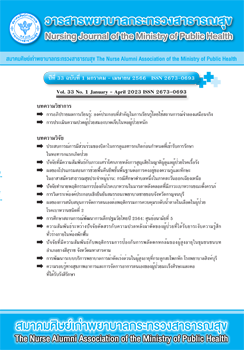ปัจจัยที่มีความสัมพันธ์กับภาวะเศร้าโศกภายหลังการสูญเสียในญาติผู้ดูแลผู้ป่วยโรคเรื้อรัง
Main Article Content
บทคัดย่อ
การวิจัยครั้งนี้เป็นการวิจัยเชิงบรรยายมีวัตถุประสงค์เพื่อศึกษาภาวะเศร้าโศกภายหลังการสูญเสียและปัจจัยที่มีความสัมพันธ์กับภาวะเศร้าโศกภายหลังการสูญเสียในญาติผู้ดูแลผู้ป่วยโรคเรื้อรัง ได้แก่ คุณภาพของภาวะใกล้ตายและขณะตาย การสนับสนุนจากครอบครัวและระยะเวลาในการดูแล โดยใช้กรอบแนวคิดการสูญเสียและความเศร้าโศกในการศึกษา กลุ่มตัวอย่างเลือกแบบเจาะจงเป็นญาติผู้ดูแลหลักของผู้ป่วยโรคเรื้อรังที่เคยมารับการรักษาในโรงพยาบาลระดับทุติยภูมิในสังกัดกรุงเทพมหานครจำนวน 86 ราย เครื่องมือที่ใช้ในการเก็บรวบรวมข้อมูล ได้แก่ แบบบันทึกข้อมูลส่วนบุคคล แบบประเมินคุณภาพของภาวะใกล้ตายและการตาย แบบประเมินการสนับสนุนจากครอบครัว และแบบประเมินอารมณ์เศร้าโศกจากการสูญเสียที่ผิดปกติ ซึ่งผ่านการตรวจสอบความตรงตามเนื้อหาจากผู้เชี่ยวชาญ และหาค่าความเชื่อมั่นสัมประสิทธิ์แอลฟาครอนบาค ได้ค่าเท่ากับ .92, .93 และ .93 ตามลำดับ วิเคราะห์ข้อมูลโดยใช้สถิติพรรณนาและสถิติสหสัมพันธ์ของสเปียร์แมนแรงค์ ออเดอร์ ผลการศึกษาพบว่าภาวะเศร้าโศกภายหลังการสูญเสียในญาติผู้ดูแลผู้ป่วยโรคเรื้อรังไม่มีความสัมพันธ์กับคุณภาพของภาวะใกล้ตายและขณะตาย (r = -.117, p>.05) การสนับสนุนจากครอบครัว (r=-.161, p>.05) และระยะเวลาในการดูแล (r=.029, p>.05) อย่างไรก็ตามผลการศึกษาครั้งนี้พบว่าญาติผู้ดูแลมีภาวะเศร้าโศกภายหลังสูญเสียที่ผิดปกติ จำนวน 23 ราย คิดเป็นร้อยละ 27 ถึงแม้ว่าส่วนใหญ่ ร้อยละ 60.5 ญาติจะมีการเตรียมความพร้อมและเตรียมใจต่อการเสียชีวิตของผู้ป่วยและได้รับการสนับสนุนจากครอบครัวอยู่ในระดับสูง (Mean=14.84, SD=4.21) อีกทั้งคุณภาพของภาวะใกล้ตายและขณะตายตามการรับรู้ของญาติผู้ดูแลอยู่ในระดับปานกลาง (Mean=59.33, SD=16.67) ผลการศึกษานี้สามารถใช้เป็นข้อมูลพื้นฐานในการดูแลผู้ป่วยระยะสุดท้ายและครอบครัว
Article Details

อนุญาตภายใต้เงื่อนไข Creative Commons Attribution-NonCommercial-NoDerivatives 4.0 International License.
บทความและรายงานวิจัยในวารสารพยาบาลกระทรวงสาธารณสุข เป็นความคิดเห็นของ ผู้เขียน มิใช่ของคณะผู้จัดทำ และมิใช่ความรับผิดชอบของสมาคมศิษย์เก่าพยาบาลกระทรวงสาธารณสุข ซึ่งสามารถนำไปอ้างอิงได้
เอกสารอ้างอิง
Yaiyong O. Depression and grief of the elderly at the elderly associate in Nonthaburi Province (Dissertation). Bangkok: Chulalongkorn University;2010.
Fujisawa D, Miyashita M, Nakajima S, Ito M, Kato M, Kim Y. Prevalence and determinants of complicated grief in general population. J Affect Disord.2010;127(1-3):352-8. doi:10.1016/j.jad.2010.06.008
Kumkwan Y, Chaiyawut P. Preparation of caregivers to promote death, dignity, in the end of life patients Phranakhon Rajabhat Research Journal (Science and Technology).2011;11(2):125-38.(in Thai)
Lundorff M, Holmgren H, Zachariae R, Farver-Vestergaard I, O’Connor M. Prevalence of prolonged grief disorder in adult bereavement: A systematic review and meta-analysis. J Affect Disord.2017;212:138-49. doi:10.1016/j.jad.2017.01.030
Wanna R. Prevalance of complicated grief and associated factors in psychiatric outptients at King Chulalongkorn Memorial Hospital. Bangkok: Chulalongkorn University;2014.
Artsanthia J, Pomthong R. Nurses’role: case study of psychological care for caregivers of patients with terminal illness. Journal of The Royal Thai Army Nurses.2018;19(1):1-8.
Stroebe MS, Folkman S, Hansson RO, Schut H. The prediction of bereavement outcome: development of an integrative risk factor framework. Soc Sci Med.2006;63(9):2440-51. doi:10.1016/j.socscimed.2006.06.012
Smilkstein G, Ashworth C, Montano D. Validity and Reliability of the Family APGAR as a Test of Family Function. The Journal of family practice 1982;15(2):303-11.
Chiu YW, Yin SM, Hsieh HY, Wu WC, Chuang HY, Huang CT. Bereaved females are more likely to suffer from mood problems even if they do not meet the criteria for prolonged grief. Psychooncology. 2011;20(10):1061-8.doi:10.1002/pon.1811
Tomarken A, Holland J, Schachter S, Vanderwerker L, Zuckerman E, Nelson C, et al. Factors of complicated grief pre-death in caregivers of cancer patients. Psychooncology. 2008;17(2):105-11. doi:10.1002/pon.1188
KIM M, CHO C, LEE C. A concept analysis of quality of dying and death (qodd) for non-cancer patients: from the perspective of palliative care. Asian Journal of Human Services.2015;9:96-106.
Patrick DL, Engelberg RA, Curtis JR. Evaluating the quality of dying and death. Journal of Pain and Symptom Management.2001;22(3):717-26.
Garrido MM, Prigerson HG. The end-of-life experience: modifiable predictors of caregivers’ bereavement adjustment. Cancer.2014;120(6):918-25.doi:10.1002/cncr.28495
Wilson DM, MacLeod R, Houttekier D. Examining linkages between bereavement grief intensity and perceived death quality. OMEGA - Journal of Death and Dying.2016;74(2):260-74.doi:10.1177/0030222815598442
Ckumdee S, Arpanantikul M, Sirapo-ngam Y. Family Caregivers’ Adjustment Problems in Caring for Stroke Patients. Thai Journal of Nursing Council. 2014;29(4):45-63.(In Thai)
Sathianphattharanan R. Loss experiences of spouses after dying of terminally ill patients at King Chulalongkorn Memorial Hospital. Bangkok: Chulalongkorn University;2014.
Groot MHD, Keijser JD, Neeleman J. Grief shortly after suicide And natural Death: A comparative study among spouses and first-degree relatives. Suicide and Life-Threatening Behavior.2006;36(4):418-31.
Thomas K, Hudson P, Trauer T, Remedios C, Clarke D. Risk factors for developing prolonged grief during bereavement in family carers of cancer patients in palliative care: a longitudinal study. J Pain Symptom Manage.2014;47(3):531-41.doi:10.1016/j.jpainsymman.2013.05.022
Romero MM, Ott CH, Kelber ST. Predictors of grief in bereaved family caregivers of person’s with Alzheimer’s disease: a prospective study. Death Stud.2014;38(6-10):395-403.doi:10.1080/07481187.2013.809031
Sombutteera K, Thavornpitak Y. Response rate and factors associating mailed questionnaire response rate in nursing sciences and public health research. KKU Research Journal (Graduate Studies).2015;15(1):105-13.
Siriso J. selected factors related to the quality of death of person with terminal cancer perceived by family caregivers. Bangkok: Chulalongkorn University;2016.
Prigerson HG, ewskib PKMlj, Reynolds CF, Bierhals AJ, Newsom JT, Fasiczkaa A, et al. Inventory of complicated grief: a scale to measure maladaptive symptoms of loss. Psychiatry Research.1995;59:65-79.

